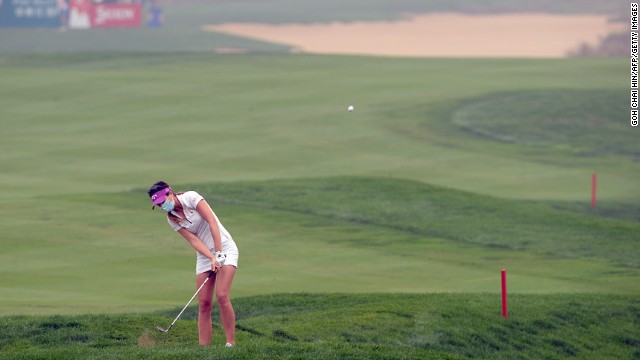Golfers don masks on fairways as smog chokes Beijing's big sporting weekend

International golfers were choking on the greens in Beijing over the weekend – but it wasn’t due to an outbreak of the yips.
Hazardous levels of pollution descended on the Chinese capital during its biggest sporting weekend of the year so far, affecting competitors and spectators alike at an LPGA golf event and the China Open tennis championship, which boasted such big names as Novak Djokovic, Rafael Nadal and Serena Williams.
The sight of golfers wearing surgical-style face masks at the Reignwood LPGA Classic was hardly the advertisement that the sport was seeking for the first Ladies Professional Golf Association event to be held in China. Play was delayed for several hours Sunday to attempt to give the smog time to clear, before players including Germany’s Sandra Gal and Colombia’s Mariajo Uribe took to the fairways donning masks.
Spectators at tennis’ China Open, where Djokovic triumphed in the men’s final and Williams in the women’s, were also photographed wearing protective face masks.
The pollution levels – which saw visibility drop to less than 500 meters at times, according to China’s National Meteorological Centre, and prompted the U.S. Embassy to advise its citizens to stay indoors and run air purifiers – has led to questions being raised of the viability of international sporting fixtures in the northern Chinese city, or at least their continued ability to draw big names.
Swedish doubles player Robert Lindstedt remarked about the dire conditions in his blog, labeling the air quality “a disaster” and “a joke.”
“How much of your life disappears when you spend time here?” he wrote. “Already after a few days I feel that I am not doing too good. I get dizzy when I get up. Yesterday I couldn’t recover between points in practice and was breathing heavily the whole hour. If you blow your nose in the evening, the paper turns black. It’s just not healthy to be here. I should probably think about that next year.”
David Shin, director of Sporting Republic, a company that organizes sports events in Asia, said it was unlikely Beijing would be able to continue to attract big names at sporting events unless pollution issues were addressed.
“Beijing will always have big sporting events because they’ll get the sponsorship and support from local government. But in terms of the caliber of the athletes – the top athletes will have concerns about coming to Beijing. Regardless of their prize money and the lucrative offers they’ll get to participate – they’ll have doubts about whether it will affect their health in the long term. If it does, is it worth coming?”
Lindstedt is not the first athlete to raise concerns about competing in Beijing’s smog. In 2008, reigning marathon world record holder Haile Gebrselassie refused to contest the event at the Beijing Olympics due to fears of the impact on his asthma, saying to do so would be “committing suicide.”
A year earlier, the women’s tennis number one Justine Henin pulled out of the China Open in the city for the same reason, while in 2011, organizers at the event were forced to turn on floodlights in the afternoon to allow play to continue amid the heavy smog.
Shin, whose firm organized the Beijing Vertical Marathon up a skyscraper in August, said the capital’s pollution levels were a particular concern for potential participants in running events in the city, and were among the reasons why the city’s marathon, to be held later this month, would likely struggle to attract top-tier talent.
“When it comes to runners, pollution in the air really affects their performance. We have to advise them to actually just stay at the hotel and train in the gym,” he said. “There are times when I’ve stayed at hotels in Beijing and haven’t been able to see out the window.”
The pollution issue meant the company had to give “serious thought” to running any sports events in the city. “As an event organizer safety is our first priority,” he said. “Even if you have a few serious incidents where people have to go to hospital because of the pollution, then that makes it not worth doing.”
The smog, which also grounded a number of international flights out of the capital, came at the end of China’s October 1-7 “Golden Week” holiday, a peak travel time for Chinese families to travel. Six major highways were closed Sunday, exacerbating the problem.
Djokovic acknowledged the pollution issue after the event, saying it was less than ideal, but that players knew what they were dealing with.
The Reignwood LPGA Classic was won by one shot by China’s Feng Shanshan, in her second career victory.
You can return to the main Market News page, or press the Back button on your browser.

